|
February 4, 2020
First
Anniversary of Deaths of Three Rail Workers
in Field, BC Derailment
Growing
Demand for
Independent Investigation

Demands from Quebec Public
Sector Workers in Health and Social Services
• Interview, Jennifer
Genest, Spokesperson for the Sectoral Table for the SQEES-FTQ
• Interview,
Benoît Taillefer, President, Workers' Union, Health and
Social Services Centre, Bordeaux-Cartierville-Saint-Laurent (FSSS-CSN)
Forestry
Workers' Struggles Across the Country
• Support the Just
Demands of Striking Coastal Forestry Workers
• Closures of Fortress
Pulp Mill and Lauzon Sawmill in Thurso,
Quebec - Pierre Soublière
First Anniversary of Deaths
of Three Rail Workers in Field, BC Derailment

Left to right: Daniel Waldenberger-Bulmer, Andrew Dockrell and Dylan
Paradis. Photos are from a fundraising page set up by the Teamsters
Canada Rail Conference to assist workers' families.
On February 4, 2019, conductor Dylan Paradis,
engineer Andrew Dockrell and trainee Daniel Waldenberger-Bulmer,
Canadian Pacific Railway crew members, were killed when their runaway
train derailed and plunged 60 metres from a bridge into the Kicking
Horse River in BC, near the town of Field, after its air brake system
failed. The workers had just taken over the train consisting of three
locomotives and 112 cars. All three workers were based in Calgary and
were members of the Teamsters Canada Rail Conference.
On the occasion of the first anniversary of the
death of the workers, the demand is growing for an independent police
investigation into the Field derailment in which they lost their lives.
On January 26, CBC TV's the Fifth Estate
aired its documentary about the tragedy, Runaway Train.
In it, the victims' loved ones expressed their anger at the fact that
the CP Rail Police Service shut down its investigation after just a
month and that the investigation was limited to only the actions of the
crew members prior to the crash. This is the only police investigation
into the tragedy.
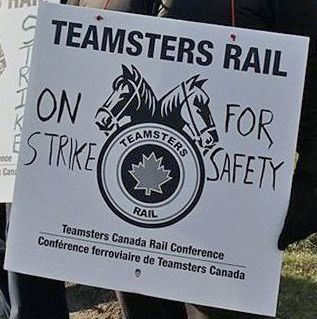 The documentary
features the allegations of a former investigator with CP Rail's police
force that the company prevented him from obtaining key witness
accounts, withheld evidence, and ordered officers to keep the
investigation narrowly focused on the crew. CP Rail denies any cover-up
and calls this former investigator a "disgruntled employee" and says it
is going to wait for the investigation report from the Transportation
Safety Board (TSB) before making any comments on the cause of the
tragedy. The TSB report is not expected to be completed for another
year. The documentary
features the allegations of a former investigator with CP Rail's police
force that the company prevented him from obtaining key witness
accounts, withheld evidence, and ordered officers to keep the
investigation narrowly focused on the crew. CP Rail denies any cover-up
and calls this former investigator a "disgruntled employee" and says it
is going to wait for the investigation report from the Transportation
Safety Board (TSB) before making any comments on the cause of the
tragedy. The TSB report is not expected to be completed for another
year.
Dylan Paradis' mother is demanding a
criminal investigation into the deaths. On January 26, Teamsters Canada
joined in, calling for an independent RCMP investigation into the
deadly incident. The union is also reiterating its call for the federal
government to abolish corporate police forces. Two days later, on
January 28, the Alberta Federation of Labour also demanded independent
investigation into the deaths of the three workers.
"Three of our brothers died in that derailment.
If CP has nothing to hide, they should welcome an outside investigation
for the sake of the families and all those affected by this disaster,"
said François Laporte, President of Teamsters Canada.
"Moreover, corporate police forces have no place
in the modern world. It is absurd that a company should be able to
criminally investigate itself. They'll never find themselves guilty of
anything," added Laporte. "We once again call on the government of
Canada to abolish all forms of private policing."
There are many reasons that justify an
independent criminal investigation into the tragedy.
The CP Police Service's Website states:
"As defined by Section 2 of the Canadian Criminal Code,
members have exactly the same powers as every other police officer in
Canada. Members can detain, arrest, use force, search and compel people
to court and although they are employed by the railway company they are
deemed to [be] public servants the same as city police who are employed
by the municipality but are agents of the Crown.
"In the United States our members are fully
commissioned police officers within the State in which they operate,
empowered by that State to enforce the law. The extent to which railway
police officers may exercise law enforcement authority and definition
of jurisdiction varies by State."
According to the Railway Association of Canada,
the CP Police Service was founded in 1913, making it the oldest
operation of its kind in Canada. Canada's other Class 1 and passenger
railways -- including CN, VIA Rail, GO Transit and more -- all have
private police services with the same powers as the CP Police Service.
Under the current neo-liberal state arrangements,
the rail monopolies are already self-regulating when it comes to
enforcement of safety and other standards. The perpetuation of the CP
Police Service under such conditions is an extreme form of
self-regulation. The CP Police Service can declare that it has
conducted a satisfactory investigation, that it saw no purpose in
investigating anything other than the actions of the crew, and this is
considered to pass for state authority. No findings have to be
published according to the culture of monopoly secrecy that is part of
self-regulation. According to CP Rail's response to the Fifth
Estate, "As a matter of law, the RCMP has jurisdiction
throughout Canada, including on CP's property." That is precisely the
language of self-regulation, that the RCMP, or Transport Canada and the
federal government, have "jurisdiction." The actual exercise of
jurisdiction falls to CP and its police force, with the Canadian state
providing CP's decisions with impunity by turning a blind eye. The TSB
report is expected to come out in a year, but the TSB has no power to
lay charges and can only publish findings and make recommendations.
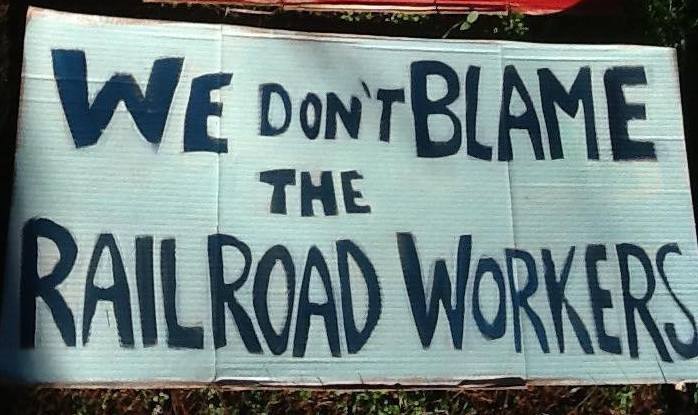 CP's decision to
not investigate anything other than the actions of the crew prior to
the crash, with even that part not made public, and only referred to as
showing no need for further investigation, leaves in the shade why the
train started to move on its own, once it had stopped on that steep
hill for an "emergency." It is said that the train was kept immobilized
with air brakes only once stopped. CP's manuals are quoted saying how
in winter "cold weather increases air leakage in a train's air brake
system," and that is a "major challenge." Why were hand brakes not
ordered to be applied by CP, in this extreme cold weather, once the
train was stopped for an alleged "emergency"? When the takeover crew
went into action, it was already too late, the train started to move on
its own, out of control. This area is considered to be one of the most
dangerous in North America for trains, especially in extreme cold
weather. All of this remains unclear, while urgent answers are needed. CP's decision to
not investigate anything other than the actions of the crew prior to
the crash, with even that part not made public, and only referred to as
showing no need for further investigation, leaves in the shade why the
train started to move on its own, once it had stopped on that steep
hill for an "emergency." It is said that the train was kept immobilized
with air brakes only once stopped. CP's manuals are quoted saying how
in winter "cold weather increases air leakage in a train's air brake
system," and that is a "major challenge." Why were hand brakes not
ordered to be applied by CP, in this extreme cold weather, once the
train was stopped for an alleged "emergency"? When the takeover crew
went into action, it was already too late, the train started to move on
its own, out of control. This area is considered to be one of the most
dangerous in North America for trains, especially in extreme cold
weather. All of this remains unclear, while urgent answers are needed.
The demand for an independent police
investigation is not to give carte blanche to the
RCMP. It is a demand to break this wall of secrecy and power
to act with impunity. It is a rejection of the refusal to render
account to the workers and the public because private monopolies are
considered the creators of social wealth, while the workers and people
are treated as an impediment to these monopolies increasing their
narrow private profit at all costs. People want to play an active role
in finding out what has happened and want to have a say in remediation
and redress which may include charges of criminal negligence against
the company. Otherwise, to speak of preventing future tragedies is
hollow.

Demands from Quebec Public
Sector Workers in Health and Social Services
Workers' Forum:
How many members does the Quebec Union of Service Employees, affiliated
with the Quebec Federation of Labour (SQEES-FTQ), represent, and what
work do they do?
Jennifer Genest:
The SQEES represents 25,000 members across Quebec, mainly in the health
and social services sector. It represents around 8,000 public sector
workers from that sector. More precisely, they are found either in
public establishments, such as the large CISSS and CIUSSS (Integrated
Health and Social Services and Integrated University Health and Social
Services) or in private establishments under agreement, which are
health establishments managed by private employers but which benefit
from the same working conditions as in the public sector. The SQEES is
also the largest union in private residences for the elderly.
WF:
What is the main thrust of SQEES sectoral requests?
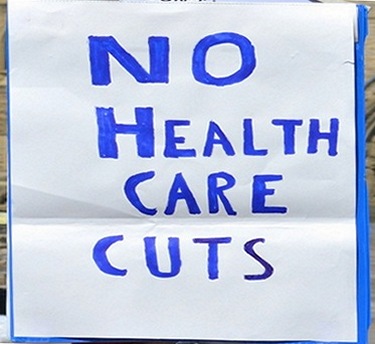 JG:
We are aiming to retain the workforce that is currently there and to
attract young people who are not at all attracted to come to work in
health, and rightly so I imagine. Our demands are aimed at stabilizing
the people who are currently working and attracting new workers. JG:
We are aiming to retain the workforce that is currently there and to
attract young people who are not at all attracted to come to work in
health, and rightly so I imagine. Our demands are aimed at stabilizing
the people who are currently working and attracting new workers.
This is done by different means. For example, we
are doing a lot of work on premiums. There are a multitude of premiums
in the collective agreement, but they are ineffective and do not
correspond to current needs. We are doing a lot of work to update the
premiums and add many new ones.
Training premiums are an example. Employees have
an obligation to train new work colleagues. However, training premiums
currently exist only for those workers in the nursing care category.
The whole support and administrative staff trains the new workers for
free, so to speak. This increases the work load of these workers but
without any additional remuneration. We must make sure that the current
benefits enshrined in the collective agreement apply, that workers have
access to them. Take the issue of holidays and leave. The current
collective agreement is adquate and even generous with regard to
holidays and leave, and yet people do not have access to their
statutory holidays because there is nobody to replace them. The same
applies to various personal leaves, without pay, which require the
agreement of the employer. The employer often does not grant them
because we do not have the necessary staff to replace these people.
There are many things in the collective agreement that do not
materialize.
There are critical care premiums in highly
specialized services, such as psychiatric emergency services. These
premiums are only accessible to nursing staff. They are not for support
staff or administrative workers who are just as likely to be hit by
aggressive patients.
Our other main demand concerns health and safety.
Rates of physical or psychological injuries have
exploded in the health network since the 2015 reform, courtesy of
Health Minister Barrette. It's catastrophic. The sums involved are
astronomical and there is no prevention done in a concrete and
effective way in the health network. The Act respecting
occupational health and safety provides for various
mechanisms for enforcing prevention in establishments, but these are
based on the assessment of the level of risk that exists. There are six
categories of employers in the act, but prevention mechanisms are
mandatory only in sectors designated as priority sectors, and the
health care network is not a priority sector. Besides what is provided
for in collective agreements, which is not really binding, employers
have no legal obligation to do prevention. However, prevention is the
key to success in reducing the level of injuries. It is high time that
the health and social services network be recognized as a priority
sector by law. In the event that there is no legislative change, the
same prevention mechanisms will have to be provided for through
collective agreements.
The explosion in the rate of injuries revolves
around the shortage of personnel. When there is a shortage of staff,
there is an overload of work and when this happens there can be two
consequences: a psychological consequence because the burden is such
that the workers have to take a leave of absence because of burnout;
physical consequences because overworked workers have to work in less
than optimal conditions, work alone when there are supposed to be two
of them, and work very quickly. This causes accidents.
Employers cannot hire the necessary staff for
budgetary reasons.
With the 2015 reform, when the establishments
were merged, the budgets for hiring staff were all frozen. We have to
do more with less. At the same time, there are many available positions
that are posted, but that we are unable to fill because of the
conditions.
In addition, in the employers' responses to our
demands at the sectoral table, we were given the line that we need to
keep doing more with less, that we must keep changing work schedules,
or deny people's right to work/family balance, which is a hard-won gain
from the negotiations for the last collective agreement.
In conclusion, health and safety is a priority
with regard to the SQEES. Of equal priority is the promotion of jobs in
the health network by improving working conditions, respecting current
working conditions which are included in the collective agreement,
retaining those who are currently working and attracting the next
generation of workers.

Workers' Forum:
What group of public sector workers do you represent and what are their
main concerns and demands?
Benoît Taillefer:
I represent workers at the Health and Social Services Centre (CSSS) in
Bordeaux-Cartierville-Saint-Laurent in Categories 2 and 3. Category 2
is all the auxiliary services: the care attendants, the kitchen,
laundry, and sanitation workers; the skilled and maintenance workers.
It is amongst them that one finds the largest number of low-paid
workers in health and social services, people at the bottom of the
income ladder. Category 3 includes office staff, administrative
technicians and agents.
With regard to our demands, the first thing I want to talk about is
wages. Our wage demands are legitimate. Since 2005, under the Liberals,
we've been trampled on big time in terms of wages. We are asking for a
wage adjustment in relation to the private sector and to our needs,
which is normal. Wage-wise, we've been going down the ladder since at
least 2005. As a priority at the central table, in the first year we
are asking for an increase of $3 per hour for everyone. After that, we
are asking for an increase of $1 per hour for every year of the
three-year agreement, or three per cent and then three per cent per
year, whichever is more advantageous. For low-paid workers, an extra
dollar an hour in the second and third year may be more advantageous
than 3 per cent, while for people with higher wages, the three per cent
is more advantageous. At the federation [CSN], we have unanimity on
this demand. People with higher salaries, such as teachers and
professionals, have agreed to support us. They agree that we should put
the priority on those with the lowest wages with the $3 for the first
year for everyone. It's a fine example of the solidarity we pride
ourselves on.
At the sectoral level, one of the most important issues is
privatization, centralization and subcontracting. We are very targeted
by this, especially those who are skilled workers. Employers rely on
the private sector for such things as snow removal, which makes no
sense, or for electrical work that our electricians are perfectly
capable of doing. It may be advantageous for the employer to hire
workers through private firms, because they are not unionized, do not
have the same conditions, have no employment link, or insurance or
pension funds. Increasingly, private firms are being called on, even
though our people are capable of doing the job, often at a lower cost.
The onus is on the union to prove that, which we can do, but it takes
an enormous amount of time, while the employer has all the staff to do
it and should be doing it. A manager who is efficient should prioritize
his own people, especially if it costs less. Our workers have the same
competence cards as those from the private sector. In the case where
there is a shortage of workers, when the demand is greater than supply,
we should hire workers. Of course in the case of skilled workers, we're
not attractive compared with the private sector in terms of wages and
conditions. Conditions have to be improved to further attract and
retain workers.
In terms of health and safety, we want to be considered a priority
group within the Act
respecting occupational health and safety. This is not
currently the case. One of our major problems is psychological
distress. The latest statistics reveal that at the level of the
federation, 54 per cent of our members suffer from psychological
distress. In our sector, this is a major problem. We also have a lot of
problems with regard to violence, both verbal and physical, especially
when it comes to those who provide home care. Cases are becoming more
and more complex, and there is a lot of trivialization of what is
happening to care attendants. Increasingly, we are dealing with
psychiatric patients. Psychiatric units are opened, with the employer
simply decreeing that they are open, but our people are not trained to
deal with such situations. Psychological distress is caused by many
factors, such as work overload, a lack of appreciation, a lack of
autonomy. Those with low wages at the bottom of the ladder do not
receive the recognition and appreciation they deserve. We need
assistance, more staff, more efficient work plans which include the
necessary resources and which are actually implemented. In the current
situation, people are being over-worked because they are entirely
devoted to getting the job done at all costs, even if that means
compromising our health and safety. We also have a lot of physical
problems, with people getting injured on the job.
The priority in all of this is wages. Within such adverse conditions,
more adequate wages are needed. We need more recognition, wage-wise of
course, as well as all-round recognition. The fact that we don't have
diplomas doesn't mean that we aren't any good, that we are second class
workers or a sub-category. We must be heard, not only for appearances'
sake, but really heard, in all the existing bodies.
WF: What do you want
to say in conclusion?
BT: Neo-liberal
governments are promoting a lot of disinformation about us, that we are
the fat cats of the system. It's not true. We deserve public
recognition. We must inform people, make them aware. We're only asking
for what is owed to us. I think that increasingly the public recognizes
this. Our claims are legitimate. We have a lot of people who are very
dedicated, who endure in silence, and who are much less prone to
present demands than people like me. They are entitled to wage
recognition, as well as recognition in all aspects of their work. Be it
only for them, presenting demands and fighting are worth it.

Forestry Workers' Struggles
Across the Country
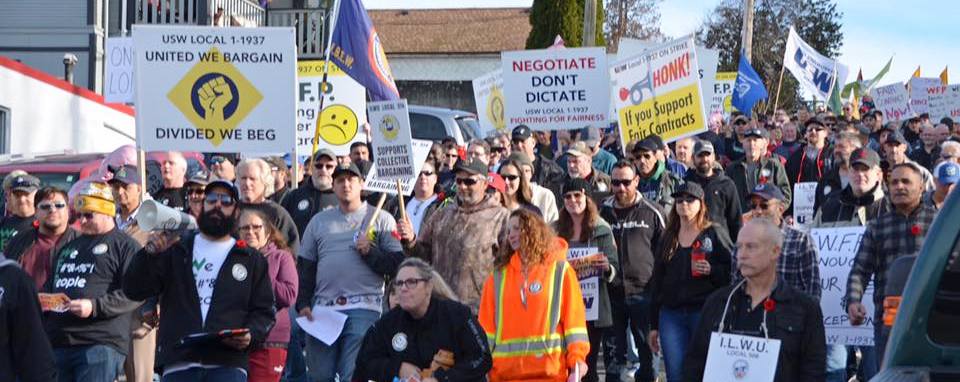
Striking WFP workers rally in Nanaimo, November 6, 2019.
Coastal Forestry Workers, members of United
Steelworkers Local 1-1937, are approaching the eighth month of their
strike against Western Forest Products. In late December the bargaining
committee met with local members in Port Alberni, Ladysmith, Powell
River, Campbell River and Port McNeill to discuss the status of
bargaining and mediation and to address the pressure being put on the
workers through statements and actions of some local community leaders
and logging contractors. Citing the extreme hardships that are being
experienced in these communities as a result of the shutdown of
forestry operations, there were demands that the provincial government
intervene to impose an arbitrated settlement.
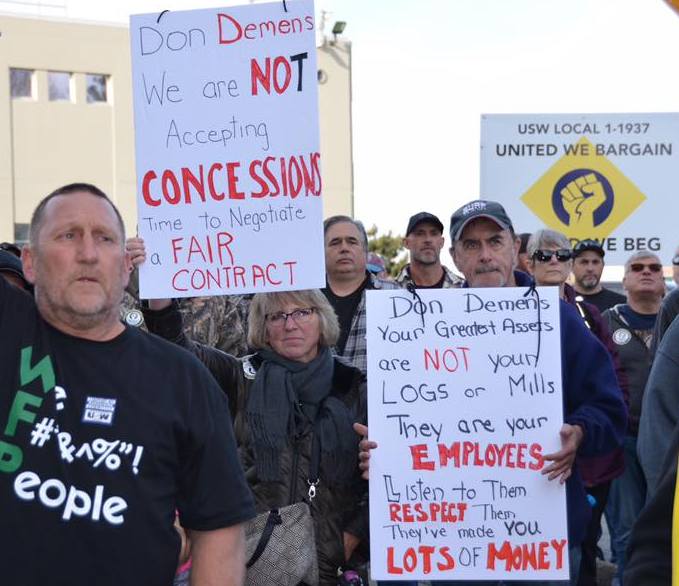 Despite the many
months on strike the workers are standing firm in their demands for a
negotiated collective agreement which protects their rights to safe
working conditions, job security and dignity on the job. Western Forest
Products is currently refusing to participate in mediation with two
government-appointed mediators, Vince Ready and Amanda Rogers. Despite the many
months on strike the workers are standing firm in their demands for a
negotiated collective agreement which protects their rights to safe
working conditions, job security and dignity on the job. Western Forest
Products is currently refusing to participate in mediation with two
government-appointed mediators, Vince Ready and Amanda Rogers.
The main issues in dispute concern the employer's
contractual right (imposed in binding arbitration in 2004) to
unilaterally impose shifts with extended hours; split days off and
other conditions that are not only dangerous but are also inferior to
the minimum standards set by the Employment
Standards Act in BC; WFP's contracting out of work; and
the company's anti-worker drug and alcohol policy.
In an effort to get the employer back to mediated
talks the union revised its proposal on alternative shift schedules
over the Christmas break and presented it to the mediators on January
9. After the mediators presented this new position to WFP they reported
back to the union bargaining committee that WFP would not comment on
the union's proposal nor would it return to mediation unless the union
agreed to concessions on contracting out. What WFP wants to do is split
logging operations between contractors who would take over specific
aspects, with falling going to one contractor, yarding, trucking,
road-building, dry-land sort -- all to different contractors. As is
already the case in other contracted out operations, contractors would
compete for the work, bid low, and then, to ensure their profits, cut
corners and cheat the workers on benefits, overtime, travel time, etc.
The workers end up isolated from one another and deprived of their
collective strength to defend their rights.
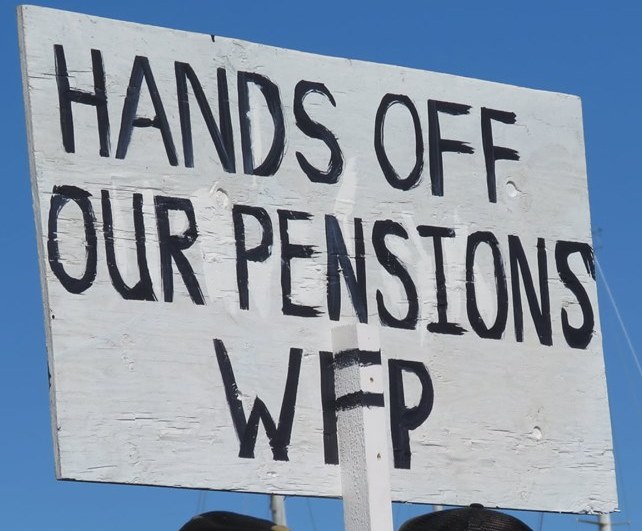 The bargaining
committee, in its bulletin of January 10, explained that this is a
union busting proposal that the company has been pushing since 1986.
"Our Union had a 4 ½ month strike in 1986 in which the Union
gained the contracting out protection we have today (Article 25). WFP
proposed gutting our members' rights by contracting out during the 2014
negotiations, but withdrew the demand and reached an agreement that led
to exceptional profits and put the Company in a sound financial
position. Now in 2019/2020 negotiations, they are again demanding our
members' jobs be contracted out." The bargaining
committee, in its bulletin of January 10, explained that this is a
union busting proposal that the company has been pushing since 1986.
"Our Union had a 4 ½ month strike in 1986 in which the Union
gained the contracting out protection we have today (Article 25). WFP
proposed gutting our members' rights by contracting out during the 2014
negotiations, but withdrew the demand and reached an agreement that led
to exceptional profits and put the Company in a sound financial
position. Now in 2019/2020 negotiations, they are again demanding our
members' jobs be contracted out."
In response to the appeal of some Mayors and
council members in the affected communities, that the government
intervene to put an end to the strike, the union undertook a series of
meetings with elected officials to explain the issues in dispute and
why a negotiated settlement and not a contract imposed through
arbitration was in the interests of the workers and the communities.
Referring to the conditions imposed by the BC Liberal government
through arbitration in 2004, the bargaining committee explained "That
appointed Arbitrator stripped away USW members' rights to have safe
working conditions, when they ripped up the workers right to maintain
an eight (8) hour work day and imposed long hours and erratic shift
schedules that have workers performing dangerous work while impaired
from fatigue and other stressors. The Arbitrator also allowed for a
massive contracting out of jobs within the coastal industry, when it
introduced Woodland contractors. This shameful action in 2004 set the
wheels in motion that created the unsafe and unfair conditions workers
face today." It was government intervention in 2004 that resulted in
the imposition of working conditions that do not meet the minimum
standards that apply to all workers in BC.
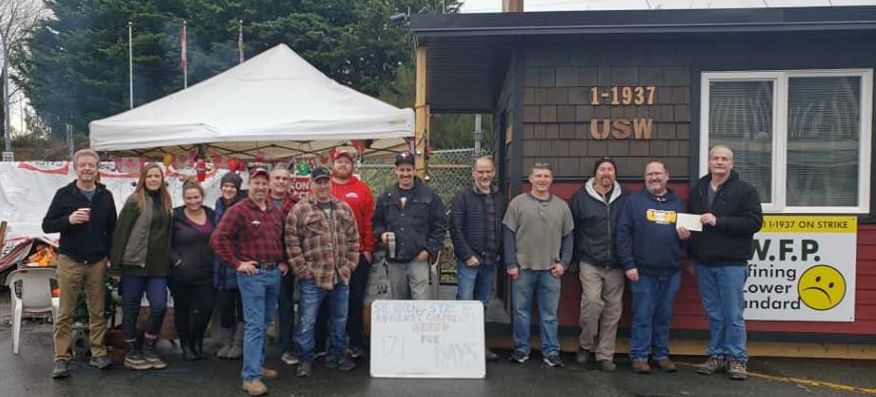
President of USW Local 6717 travels from Saskatchewan to Vancouver
Island at the end of 2019
to bring solidarity and financial support to striking forestry workers.
In the affected communities fund-raising
activities and other expressions of support for the forestry workers
continue, the most recent being a barbecue in Campbell River organized
by Loonies for Loggers which raised almost $12,000 on January 25. The
bargaining committee reported in its most recent bargaining bulletin
that in meetings with Mayors and council members in the affected
communities workers were able to explain their insistence on a
negotiated settlement that protects their job security, safety and
dignity and received a positive response.
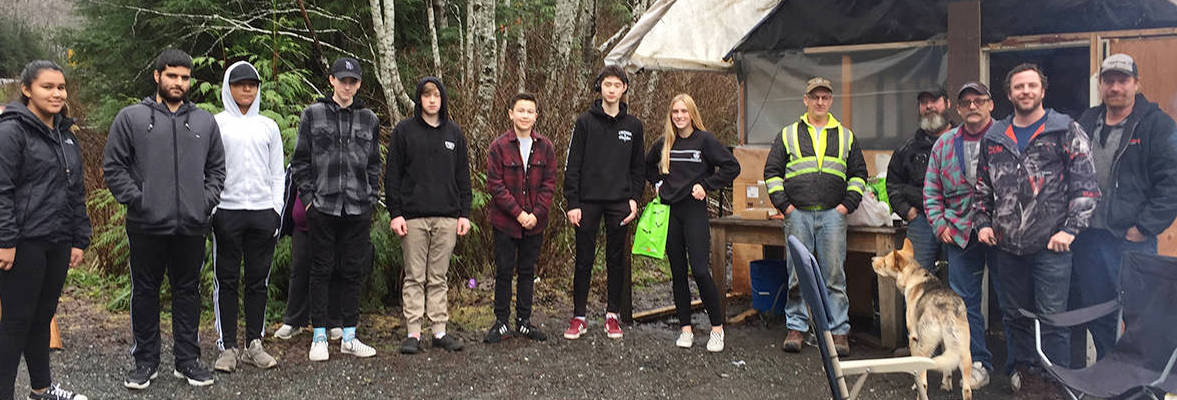
The broad community support for the striking workers was reflected in a
visit to the picket lines by Port Hardy Secondary School students who
baked cookies for the strikers. An elementary school class also visited
the lines in December 2019 to sing carols to picketers.

- Pierre
Soublière -
Two major forestry closures have hit the town of
Thurso, Quebec, which is located on the Ottawa River about 45 km east
of Gatineau. The Fortress Pulp Mill initially laid off 273 of its 323
workers in early October 2019 while it sought a buyer. On December 12,
2019, the company announced it had been unable to find a buyer and
would permanently close the mill. The closure also affects 76 forestry
producers in the Outaouais and Laurentides who are awaiting payment for
the equivalent of $800,000, according to forestry producers'
associations in the region. The producers report that Fortress Global
stopped paying for wood deliveries in October. The permanent closure of
Fortress thus affects approximately 1,000 workers working in various
fields.
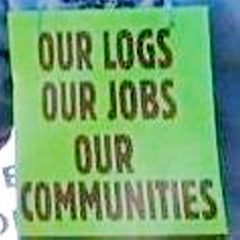 Also in October
2019, the Lauzon sawmill announced that it was going out of business,
laying off 100 workers. The closure of this sawmill, which produces
hardwood flooring, also has a direct impact on 165 forestry workers who
supply wood to the sawmill. Also in October
2019, the Lauzon sawmill announced that it was going out of business,
laying off 100 workers. The closure of this sawmill, which produces
hardwood flooring, also has a direct impact on 165 forestry workers who
supply wood to the sawmill.
The pulp mill was originally acquired by Fortress
Cellulose Spécialisée in 2010 at a cost of $3
million. The factory was then closed and converted to produce
dissolving pulp, used for the manufacture of textiles and other
products. The conversion included the addition of a 24-megawatt
cogeneration plant.
The Government of Quebec participated in
financing this project with a $102 million loan in 2010, out of a total
projected cost of $175 million. Its final cost reached $300 million. In
December 2014 the Quebec government agreed to give Fortress until 2026
to start paying back the loan, which was originally supposed to come
due on April 30, 2020.
Last September, the Legault government made a $5
million loan in the name of helping the company "maintain the
activities of its Thurso factory and the 323 jobs associated with it."
Then, on October 8, it granted another loan of $8 million to allow "the
establishment of a process to find a strategic investor for its Thurso
plant." It has yet to hold the company to account for the $800,000 it
owes to the 76 forestry producers.
On December 13, 2019, Fortress Global Enterprises
Inc. announced that its "senior secured lenders" would be commencing
"restructuring proceedings in respect of the Company and certain of its
material subsidiaries under the Companies' Creditors
Arrangement Act (CCAA)." Investissement Québec is
listed on the CCAA filing as a co-applicant/secured creditor, with
Fiera Private Debt. Inc. listed as the other co-applicant/secured
creditor. Fortress Global Enterprises, three of its subsidiaries and
one numbered Quebec company are listed as debtors. Workers in other
sectors such as steel have previously exposed the fraud that typifies
restructuring under CCAA "insolvency protection," where companies
operating in Canada act in service of global empires, and the workers
are treated as a disposable force. Thus, the situation facing workers
is sorting out how to block these companies from being able to carry
out their wrecking.
The Outaouais region was built on forestry and
related industries such as pulp, paper and lumber. This production was
initially intended to meet the needs for the British for the
construction of their marine fleet, and later, of U.S. newspapers for
newsprint. In other words, from the start, the development of this
industry was not based on a coordinated national effort to have a
self-reliant economy, but was and remains dependent on foreign
investors and markets and meeting the needs of financial oligarchs,
especially those based in the U.S. However, market needs have changed
significantly, such as newsprint being replaced with online
publications.
The precarious situation in this sector is
exacerbated by the anti-social offensive and neo-liberal agreements
such as the Canada-U.S.-Mexico Agreement which concentrates
decision-making in the hands of the financial oligarchs within the
framework of a United States of North American Monopolies. Such
arrangements permit investors to easily abscond with the social wealth
produced by the workers, while abdicating their social responsibilities
to the workers and their communities.
As Workers' Forum
explained in 2019 regarding similar closures confronting BC forestry
workers and their communities, the aggressive trade agenda of the U.S.
imperialists in collusion with big companies in Canada is using U.S.
softwood lumber tariffs to raise prices and profits in the U.S. and
drive smaller competitors out of business. It also pointed out that
“[t]he situation in Canada has worsened with the big companies
using the social wealth workers produce to eliminate workers through
technological change and to expand forestry operations in the United
States.”[1]
 The calls from
some quarters that the government should be proactive, rather than
intervening only when the damage is done, will not be able to resolve
this situation in favour of the workers. The anachronistic democratic
institutions do not permit working people to have any say in the
direction of the economy. Neo-liberal governments act in the service of
private interests by providing companies with "financial assistance"
and other pay-the-rich schemes. When these companies brutally impose
closures, as they have done in the case of Lowe's and many others, such
governments claim they can do nothing on the pretext that these are
private business decisions over which they have no control. The calls from
some quarters that the government should be proactive, rather than
intervening only when the damage is done, will not be able to resolve
this situation in favour of the workers. The anachronistic democratic
institutions do not permit working people to have any say in the
direction of the economy. Neo-liberal governments act in the service of
private interests by providing companies with "financial assistance"
and other pay-the-rich schemes. When these companies brutally impose
closures, as they have done in the case of Lowe's and many others, such
governments claim they can do nothing on the pretext that these are
private business decisions over which they have no control.
It not possible to resolve the crisis in the
forestry and other resource sectors without taking a step back and
adopting a holistic approach to review the direction of the economy,
that takes into account the working conditions of workers, the
requirements of protection of the natural environment and respect for
the hereditary rights of the Indigenous peoples. This can only be done
with the contribution of all concerned, in particular that of the
producers themselves. The situation facing working people across the
country is the need to renew the social, political and economic
arrangements and put an end to their marginalization.
Note
1. "BC Forest
Industry: The Need to Resolve the Crisis in a Manner that Favours the
People," Workers' Forum, June 13, 2019.

(To access articles
individually click on the black headline.)
PDF
PREVIOUS ISSUES | HOME
Website:
www.cpcml.ca Email: office@cpcml.ca
|

